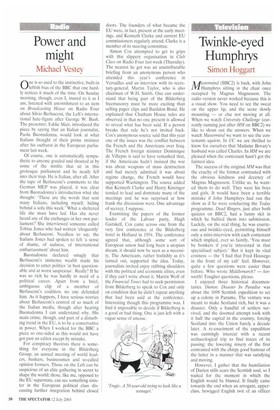Power and might
Michael Vestey
One is so used to the instinctive, built-in leftish bias of the BBC that one hardly notices it much of the time. On Sunday morning, though, even I, inured to it as I am, listened with astonishment to an item on Broadcasting House on Radio Four about Silvio Berlusconi, the Left's international hate-figure after George W. Bush. The presenter, Eddie Mair, introduced the piece by saying that an Italian journalist, Paola Buonadonna, would look at what Italians thought of their prime minister after his outburst in the European parliament last week.
Of course, one is automatically sympathetic to anyone goaded and shouted at by some of the misfits that sit in this grotesque parliament and he neatly fell into their trap. He is Italian, after all. After the tape of Berlusconi's comments to the German MEP was played, it was clear from Buonadonna's introduction what she thought: 'These are the words that sent many Italians, including myself, hiding behind a sofa this week.' What a sheltered life she must have led. Has she never heard any of the exchanges in her own parliament? She interviewed someone called Tobias Jones who had written 'eloquently' about Berlusconi. Needless to say, the Italians Jones had spoken to felt 'a sense of shame, of sadness, of international embarrassment' about him.
Buonadonna declared smugly that Berlusconi's immense wealth made his decision to enter politics 'at best questionable and at worst suspicious'. Really? If he was so rich he was hardly in need of a political career. Apart from a brief, ambiguous clip of a member of Berlusconi's coalition, no one defended him. As it happens, I have serious worries about Berlusconi's control of so much of the Italian media, though after hearing Buonadonna I can understand why. His main crime, though, and part of a disturbing trend in the EU, is to be a conservative in power. When I worked for the BBC a piece so one-sided as this would not have got past an editor except by mistake.
For conspiracy theorists there is something for everyone in the Bilderberg Group, an annual meeting of world leaders, bankers, businessmen and so-called opinion formers. Those on the Left can be suspicious of an elite gathering in secret to shape the world: those, like me, opposed to the EU superstate, can see something sinister in the European political class discussing further integration behind closed doors. The founders of what became the EU were, in fact, present at the early meetings, and Kenneth Clarke and current EU commissioners regularly attend; Clarke is a member of its steering committee.
Simon Cox attempted to get to grips with this slippery organisation in Club Class on Radio Four last week (Thursday). The nearest he got was an unattributable briefing from an anonymous person who attended this year's conference in Versailles and an interview with its secretary-general, Martin Taylor, who is also chairman of W.H. Smith. One can understand that being part of the Bilderberg freemasonry must be more exciting than selling paper clips and Basildon Bond. He explained that Chatham House rules are observed in that no one present is allowed to reveal what has been said. If a person breaks that rule he's not invited back. Cox's anonymous source said that this year one of the issues was the conflict between the French and the Americans over Iraq. The French foreign minister Dominique de Villepin is said to have remarked that, if the Americans hadn't insisted the war was about weapons of mass destruction and had merely admitted it was about regime change, the French would have supported Washington. The source added that Kenneth Clarke and Henry Kissinger tended to lead and dominate many of the meetings and he was surprised at how frank the discussions were. One advantage of secrecy, I suppose.
Examining the papers of the former leader of the Labour party, Hugh Gaitskell, Cox came across one from the very first conference at the Bilderberg hotel in Holland in 1954. The conference agreed that, although some sort of European union had long been a utopian dream, it should now be seen as a necessity. The Americans, rather foolishly as it's turned out, supported the idea. Today, journalists invited enjoy rubbing shoulders with the political and economic elites, even if they can't write about it. Martin Wolf of the Financial Times had to seek permission from Bilderberg to speak to Cox and only on condition that he didn't repeat anything that had been said at the conference. Interesting though this programme was, I find it impossible to decide if Bilderberg is a good or bad thing. One is just left with a vague sense of unease.


































































 Previous page
Previous page